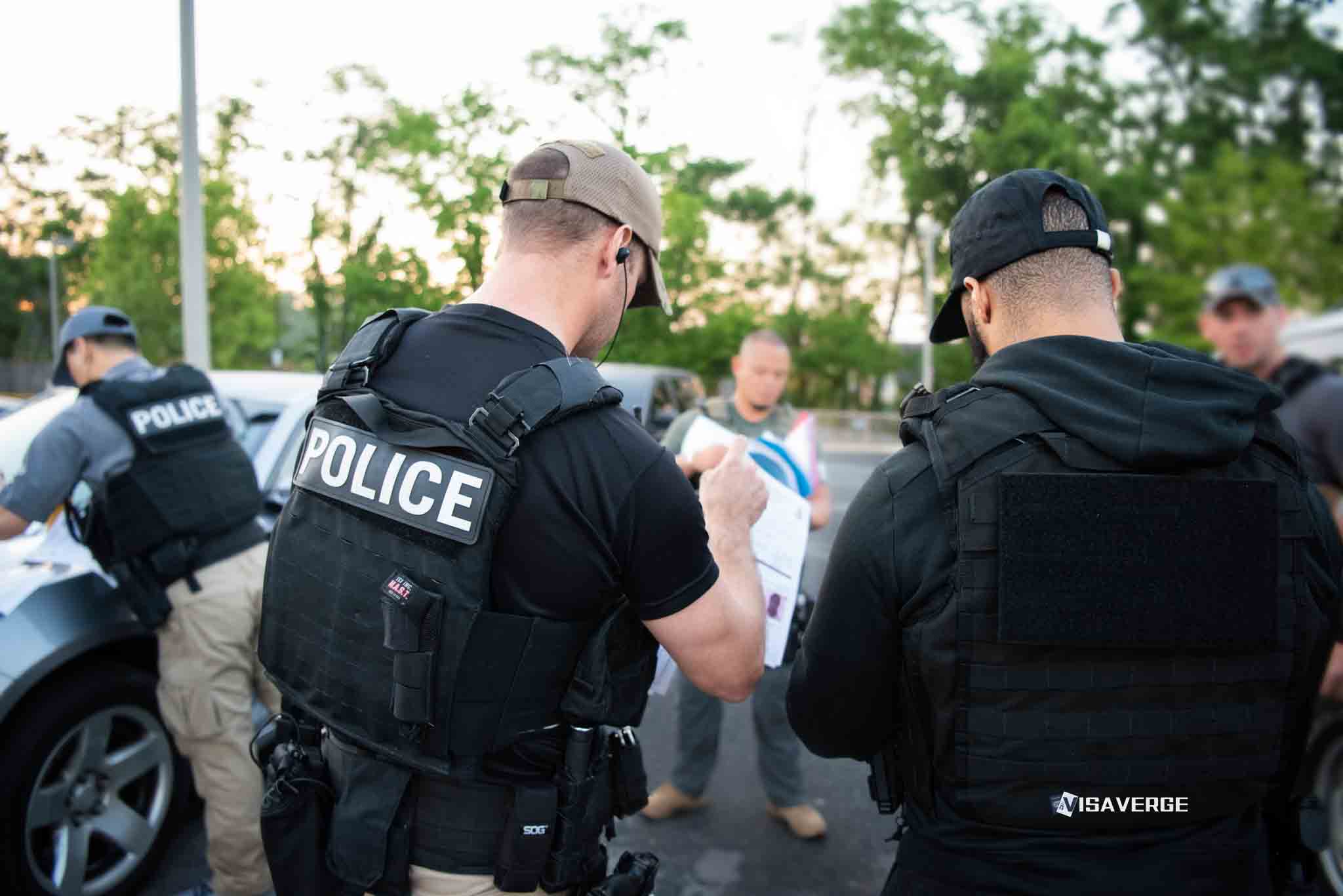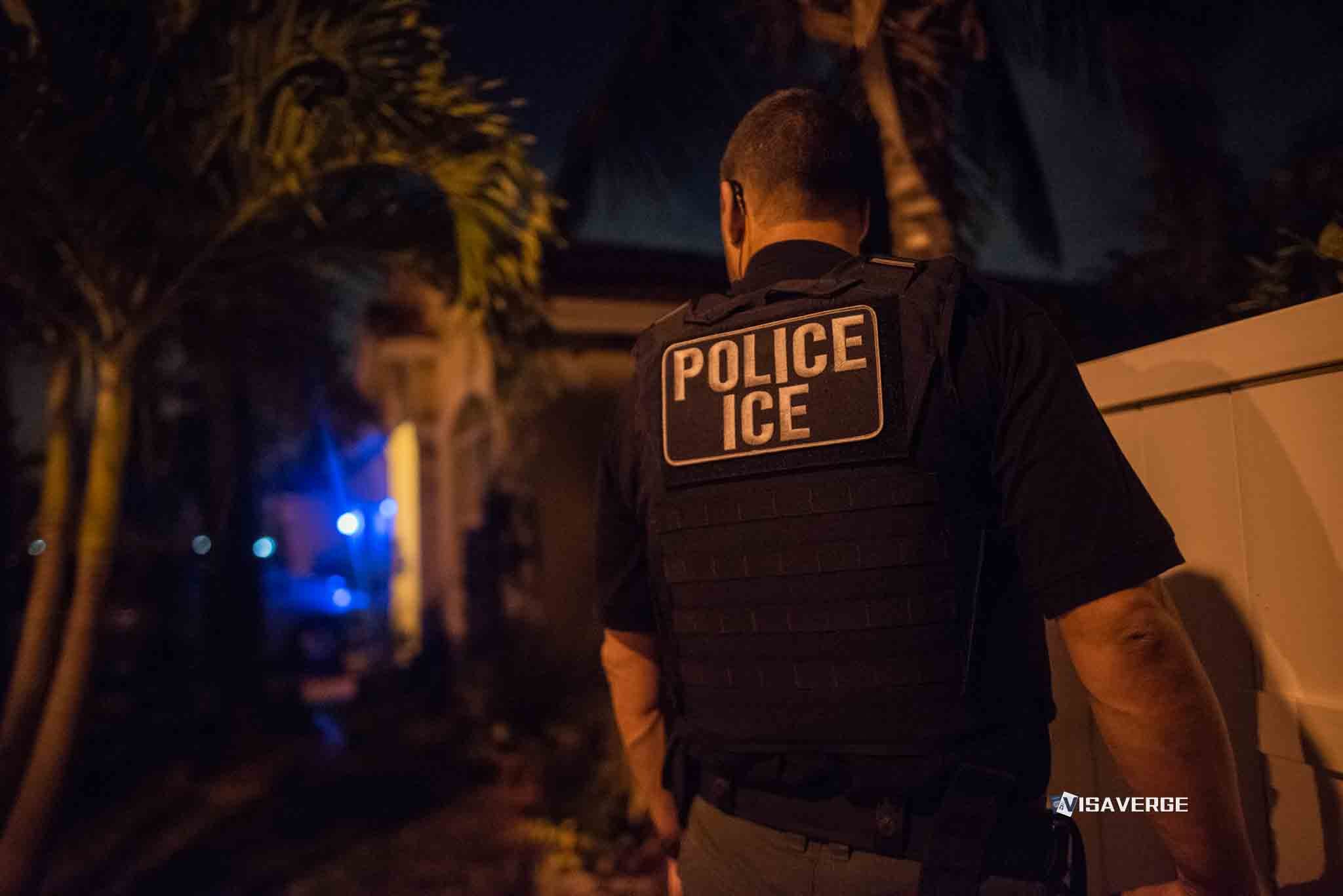Key Takeaways
• ICE officers lack authority for traffic stops but local police use 287(g) to enforce immigration during stops.
• Collaborations increased immigration arrests, raising civil rights concerns and eroding community trust in areas with 287(g).
• ICE focuses on interior enforcement targeting individuals with pending asylum or humanitarian parole statuses.
Immigration and Customs Enforcement (ICE) officers are not authorized to enforce traffic laws directly. Yet, in recent years, ICE has become increasingly involved in operations that lead to traffic stops, especially through partnerships with local law enforcement agencies. This analytical report examines the purpose and scope of ICE’s involvement in traffic stops, the methods by which these stops occur, key findings from recent operations, and the broader implications for civil rights, community trust, and immigration enforcement in the United States 🇺🇸.
Purpose and Scope

This report aims to provide a clear, fact-based analysis of how ICE officers become involved in traffic stops, despite not having the authority to enforce traffic laws themselves. The focus is on the mechanisms—particularly the 287(g) program—that allow local police to act as immigration agents, the outcomes of such collaborations, and the impact on affected communities. The analysis draws on recent operations, policy developments, and statements from key stakeholders, offering readers a comprehensive understanding of the current landscape and its potential future direction.
Methodology
The analysis is based on:
– Review of official ICE policies and public statements
– Examination of recent joint operations between ICE and local law enforcement
– Analysis of civil rights complaints and advocacy group reports
– Comparison of trends across different states and communities
– Integration of expert commentary and government data
All information is drawn from credible sources, including government websites, advocacy organizations, and investigative journalism. Where official forms or resources are mentioned, direct links to government pages are provided for reader reference.
Key Findings
- ICE officers do not have the authority to pull over vehicles for traffic violations. However, through the 287(g) program, local police can act as immigration agents during traffic stops.
- Collaborations between ICE and local law enforcement have increased, especially in states like Florida, leading to more immigration-related detentions during routine traffic stops.
- Civil rights concerns are rising, with reports of racial profiling and mistaken detentions, including cases where U.S. citizens have been held in error.
- Community trust in law enforcement is eroding in areas with active ICE-local police partnerships, as residents fear routine encounters may lead to immigration checks and possible detention.
- The focus of ICE has shifted from border enforcement to interior operations, targeting individuals with pending asylum claims, humanitarian parole, or other statuses.
- Political leaders and immigrant advocates are deeply divided on the value and impact of these collaborations.
Data Presentation and Visual Descriptions
To help readers understand the scope and impact of ICE’s involvement in traffic stops, the following sections present data and trends, with clear explanations and descriptions.
ICE and the 287(g) Program: How Traffic Stops Lead to Immigration Enforcement
What is the 287(g) Program?
The 287(g) program is a partnership between ICE and local law enforcement agencies. Under this program, local police officers receive training and authorization to perform certain immigration enforcement duties. This means that during a routine traffic stop, a local officer can check a person’s immigration status and, if there is suspicion of a violation, detain the individual and contact ICE.
How Does a Typical Traffic Stop Involving ICE Work?
- Traffic Stop Initiated: A local police officer pulls over a vehicle for a traffic violation, such as speeding or a broken taillight.
- Immigration Status Check: If the officer suspects the driver or passengers may not have legal status, they can check immigration records or ask questions about status.
- ICE Notification: If an immigration violation is suspected, the officer can detain the individual and notify ICE.
- ICE Custody: ICE agents may arrive to take custody of the individual for further immigration processing.
Visual Description: Imagine a flowchart with four boxes connected by arrows. The first box says “Traffic Stop by Local Police,” the second says “Immigration Status Check,” the third says “ICE Notified,” and the fourth says “Individual Taken into ICE Custody.” This simple flow shows how a routine traffic stop can lead to immigration detention.
Recent Operations: Data and Patterns
Case Study: Nashville, Tennessee
In a recent joint operation in Nashville, local police and ICE worked together to arrest 196 people. Most of those arrested had no prior criminal records. The operation focused on neighborhoods with large Latino populations. Civil rights groups criticized the operation, saying it targeted people based on their ethnicity and led to unnecessary fear in the community.
Case Study: Montebello, California
In another incident, a U.S. citizen was mistakenly detained during a traffic stop involving ICE and local police. The individual was held for several hours before being released. This case raised questions about the accuracy of immigration status checks and the risk of wrongful detention.
Trends and Patterns
- Increase in ICE-Local Police Agreements: More local agencies are signing 287(g) agreements, especially in states with strong anti-immigration policies.
- Shift to Interior Enforcement: ICE is focusing more on people already living in the United States 🇺🇸, rather than just those crossing the border.
- Community Impact: Large-scale operations often lead to widespread fear, even among people with legal status, as they worry about being mistakenly detained.
Visual Description: Picture a bar graph showing the number of 287(g) agreements over the past five years. The bars get taller each year, showing a steady increase in these partnerships. Next to the graph, a pie chart shows the percentage of people arrested in joint operations who had no prior criminal record—over half in some cases.
Comparisons and Broader Implications
Comparison: States with and without 287(g) Programs
- Florida: Has several statewide agencies with 287(g) agreements. Traffic stops often lead to immigration checks and detentions.
- California: Some cities have ended their 287(g) agreements, focusing instead on community policing. Fewer immigration-related detentions result from traffic stops.
- Tennessee: Active 287(g) partnerships have led to large-scale operations and community unrest.
Pattern: States with active 287(g) programs see more immigration detentions during routine police work, while states without these agreements report fewer such incidents.
Civil Rights and Racial Profiling
Civil rights groups warn that these partnerships can lead to racial profiling, where people are stopped or questioned based on their appearance or language rather than any actual violation. The American Civil Liberties Union (ACLU) and other organizations have documented cases where Latino drivers are pulled over more frequently in areas with 287(g) agreements.
Community Trust and Public Safety
When residents fear that any encounter with police could lead to immigration checks, they may avoid reporting crimes or cooperating with law enforcement. This can make communities less safe overall, as important crimes go unreported and unsolved.
Evidence-Based Conclusions
ICE’s Role in Traffic Stops Is Expanding—But Not Without Controversy
- Legal Authority: ICE officers themselves cannot pull over vehicles for traffic violations. However, through the 287(g) program, local police can act as immigration agents during traffic stops.
- Civil Rights Risks: The risk of racial profiling and wrongful detention is real, as shown by recent cases and advocacy group reports.
- Community Impact: Fear and mistrust are growing in communities with active ICE-local police partnerships, making it harder for police to do their jobs and for residents to feel safe.
- Policy Debate: Supporters, like Gov. Ron DeSantis of Florida, argue that these programs help enforce immigration laws and keep communities safe. Critics, including many immigrant advocates, say they target vulnerable populations and violate civil rights.
Limitations of the Analysis
- Data Gaps: Not all local agencies report detailed data on traffic stops and immigration detentions, making it hard to measure the full impact.
- Changing Policies: Immigration enforcement policies can change quickly with new leadership or court rulings, so trends may shift over time.
- Community Voices: While advocacy groups and officials are quoted, the direct voices of affected individuals are sometimes missing from official reports.
Practical Guidance and Next Steps
For Individuals:
– If you are stopped by police, know your rights. You do not have to answer questions about your immigration status without a lawyer present.
– Carry proof of legal status if you have it, but do not carry false documents.
– If you believe you have been targeted or detained unfairly, contact a trusted immigration advocacy group or legal aid organization.
For Community Leaders:
– Educate residents about their rights during traffic stops and police encounters.
– Work with local officials to ensure fair and unbiased policing practices.
– Monitor the impact of 287(g) agreements and advocate for transparency in law enforcement operations.
For Policymakers:
– Review the effectiveness and fairness of 287(g) partnerships.
– Ensure that civil rights protections are in place and enforced.
– Consider the impact of enforcement strategies on community trust and public safety.
Official Resources
For more information on ICE policies, the 287(g) program, and your rights during police encounters, visit the official ICE website. This site provides up-to-date information on current policies, agreements, and contact details for ICE field offices.
Expert Perspectives and Ongoing Debate
Experts and immigrant advocates continue to debate the value and risks of ICE’s growing role in traffic stops. Some argue that these partnerships are necessary for effective immigration enforcement, especially in areas with high numbers of undocumented residents. Others warn that the costs—especially in terms of civil rights and community trust—are too high.
As reported by VisaVerge.com, the expansion of ICE-local law enforcement collaborations under the 287(g) program has led to increased scrutiny from civil rights groups and government watchdogs. The future of these programs may depend on ongoing policy debates, court decisions, and the willingness of local communities to support or reject such partnerships.
Conclusion
ICE’s involvement in traffic stops through local law enforcement partnerships represents a significant shift in U.S. 🇺🇸 immigration enforcement strategy. While the goal is to identify and detain individuals with immigration violations, the approach raises serious questions about civil rights, racial profiling, and the relationship between police and the communities they serve. As more local agencies sign 287(g) agreements and ICE continues to focus on interior enforcement, the debate over the proper balance between public safety and civil liberties is likely to intensify.
Actionable Takeaways
- Stay informed about your rights and local law enforcement policies.
- Support community education efforts to reduce fear and misinformation.
- Engage with policymakers and advocacy groups to ensure fair and just immigration enforcement practices.
For the latest updates on ICE operations, the 287(g) program, and your rights, consult official resources and trusted advocacy organizations. By staying informed and involved, individuals and communities can help shape a more just and effective approach to immigration enforcement in the United States 🇺🇸.
Learn Today
ICE → U.S. Immigration and Customs Enforcement agency enforcing immigration and customs laws nationwide.
287(g) Program → A federal agreement empowering local police to perform immigration enforcement duties after training.
Interior Enforcement → Immigration enforcement activities targeting individuals inside the U.S. beyond border regions.
Civil Rights → Legal protections ensuring fair treatment and preventing discrimination, especially during law enforcement actions.
Racial Profiling → Law enforcement targeting individuals based on race or ethnicity rather than legal evidence.
This Article in a Nutshell
ICE cannot directly enforce traffic laws but partners with local police through the 287(g) program. This cooperation has increased immigration-related detentions during routine traffic stops, sparking civil rights debates and community mistrust. The expanded role targets interior immigration enforcement and raises concerns about racial profiling and wrongful detentions.
— By VisaVerge.com








